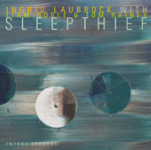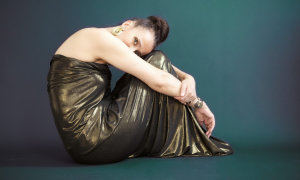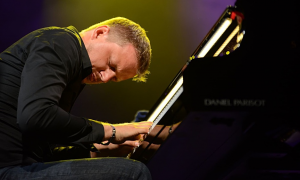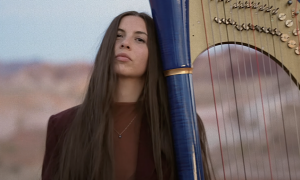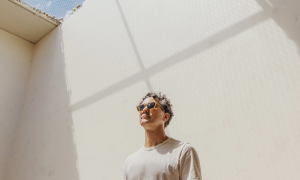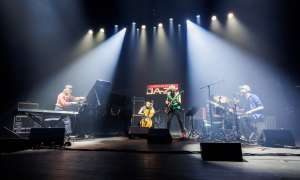Home » Jazz Articles » Interview » Esbjorn Svensson: Requiem
Esbjorn Svensson: Requiem
I think music is a way of being, it's like being kind of a god, to create a universe, to create time, to create the stars, and to create an end.
—Esbjorn Svensson
 Founder of the Swedish jazz trio, e.s.t., pianist Esbjorn Svensson and his trio were well-known for their jewel-like compositions and varied musical textures with albums including Seven Days of Falling (ACT, 2003) and Strange Place for Snow (ACT, 2002). Topping pop charts as well as garnering awards in Germany, the U.S. and Japan, e.s.t.'s lyricism and elastic imagination bridged both generations and genres since its inception in 1993.
Founder of the Swedish jazz trio, e.s.t., pianist Esbjorn Svensson and his trio were well-known for their jewel-like compositions and varied musical textures with albums including Seven Days of Falling (ACT, 2003) and Strange Place for Snow (ACT, 2002). Topping pop charts as well as garnering awards in Germany, the U.S. and Japan, e.s.t.'s lyricism and elastic imagination bridged both generations and genres since its inception in 1993.
Here, in a previously unpublished interview conducted during the IAJE conference in 2006, Svensson talks about the nature of music, life and the human condition.
Esbjorn Svensson died on June 14, 2008 in a diving accident off the coast of the fjords of Stockholm. He was 44 years old. His passing has left us a little poorer without his vision and his music.
All About Jazz: What is your background? What was the musical background in your family-what were your musical influences growing up?
Esbjorn Svensson: I grew up with my mother playing classical piano at home, I remember being two years old, sitting at her feet. She was playing the music of Fredric Chopin, Johann Sebastian Bach, Franz Liszt. My father played jazz records; he does not play an instrument. We played music constantly at home. From him I heard the music of Ellington, Charlie Parker, Thelonious Monk, Teddy Wilson, to mention a few. I grew up with jazz and with classical music, and then I discovered my own music. I was trained in classical music, there was also rock and roll and pop, starting probably at the age of ten, twelve.
AAJ: What were the groups you were listening to?
ES: There was the UK glam rock group, Slade. Chewing gum pop, (laughs) and then of course I had been listening to lots of different things like the Beatles. Oh, there was so much music, we listened to everything, there was a program on the radio called Top Ten, they played all the new music from the stage, from the UK, even from Sweden sometimes. Abba, of course. I guess my background is very much grounded in American and Swedish jazz and also classical music, mixed up with all the pop and rock and roll.
AAJ: Can you name some of the Swedish jazz people who influenced you?
ES: There was a fantastic pianist who lived in Sweden, he died in a car accident in '67 or '68, he played with a lot of musicians. His music is very well known, his name was Jan Johansson. And he made an album named Jazz in Swedish [Jazz på Svenska (1963)], he also played Swedish old folk songs in a more jazzy way. He was far beyond his time, he was an extremely interesting and exciting pianist and a very good composer. He is one of the ones that I am inspired by. There are other players like Bengt Hallberg, a pianist, the same generation as Jan, and Arne Domnerus, saxophonist, and Bengt-Arne Wallin, a composer and trumpet player, he was my teacher when I went to the University in Stockholm.
AAJ: How old were you when you started your own band?
ES: We started our first group, I think I was eleven years old. Then we had many groups over many years. The trio, e.s.t., as it's formed now, was started in '93.
AAJ: I am really interested in the creative process—your internal process. How do you go about this process? Do outside events, your political viewpoint inspire you? How do you go about composing?
ES: The way I started to write music was that I didn't know how to play. I wanted to play, so I started to compose my own music from the very first minute because I wasn't able to play any composed music. That's how I started, and I just continued doing that. Later on, when I learned to play a little bit more, I composed lots of songs, I was singing very much in the beginning. I wrote lyrics, very political lyrics for a couple of years. Singing and playing the piano, you know, sometimes playing it with a band. When I got more into jazz, I of course started try to compose jazz music, and that was a little harder for me. After a while, I think I managed to do that too. e.s.t. l:r: Esbjorn Svensson, Dan Berglund, Magnus Ostrom
e.s.t. l:r: Esbjorn Svensson, Dan Berglund, Magnus Ostrom
It's a constant process; to compose music is something I've been doing since I was twelve years old until now, more or less every day. It is a process that is constantly going on inside of me. My way of doing it now is very simple, actually. I have kids, the younger one I need to take to school, so I do so. When he is in school, I go back and I go down in my basement where I have a piano, to my little studio and I sit down there and practice and compose music. And then when day is done, I pick him up, and then the day's work is over. So I have found my way of working. I go down to my basement and compose. A lot of people used to ask me, how can you find inspiration? How can you do this, or that? I think...it's always there. I know it's always there. I think it's just... if you can relax enough to let it out...what you have to do is always believe that it's there, and maybe it will come out today, maybe tomorrow, don't stress it.
You can't push too hard; it's a very natural process that you need to take care of, to nurture. That's one part of it. Another part of it is when we're touring and where I can't sit at a piano. I do a lot of work in the touring bus or the plane or in a hotel room with no piano. I sometimes get ideas that I write down in my notebook. For me, at least, it's not that easy for me to compose without a piano. But I do a lot of it, and then when I go through it on a piano, I find out that perhaps this doesn't work, or this works fine, and sometimes I get many ideas from doing that. Then maybe later on it turns into a composition that is played by e.s.t., for example.
AAJ: This can be a very hard question or a very easy question, depending on how much one has thought about it. What is the meaning of music? Why do we do this?
ES: I think music is a way of being, it's like being kind of a god, to create a universe, to create time, to create the stars, and to create an end. When you start playing, the world, the universe could be beginning, and it could be filled with anything, and it lasts as long as the music lasts. When the music finished, that is it. It's a specific time that you create within time, within our reality; you create another universe with the piece of music you're playing. We are kind of creators, all of us when we are playing music or are listening to music. That's one way of looking at music. I don't know why we need it. I mean I don't know what human beings are at all.
But I think, that the frustrating thing with music, from one point of view it's so concrete, you can hear it, you can point out different parts of it, you can really feel it. For me at least, music is very concrete. You can divide it into small parts, you can look at in so many ways, but you can't touch it. Where is it? What is it? What is it that is creating all these emotions? Sometimes is seems to be alive. I'm thinking like at first, it's to create a universe within a universe, a new world, a new time, every time you play.
AAJ: What is the meaning of performing, what do you think it's doing for the people who are listening?
ES: It's always so hard to say. I try not to imagine at all what music could do to people and what it should do. There is no right way or wrong way to interpret our music, because you always hear it from your special, personal view. We don't play music as we think people would like to hear it, we only play music the way we want to hear it. We're starting always with ourselves, the three of us on stage, we play together, we try to connect, we try to play music that we really like. If that works, I feel that we create energy that goes out into the audience, then the audience is able to pick it up in his or her very personal way and get something from it. This creates energy that goes back to the stage, so it's very much about energy. It goes back and forth between the performer and the audience. But it's never, ever, at least for us, a concrete message. You can't say that you heard this music wrong, it's never like that, it's always up to the person who is listening.
AAJ: Right. What do you think the message is? What is it about?
ES: It's about communication. It's about listening. Not talking. It's about being able to hear something, and really listening. Through listening, you really communicate with whomever you are communicating with, the musician, the audience. That's something music really can teach people, to listen. Because what I think what we lack in this world as human beings is communication. Why we are not able to communicate is because we're not listening enough. We're too much concerned with ourselves and our own thoughts and about what we want to say instead of just listen.
AAJ: Where does improvising come from? Where are you when you are improvising?
ES: The process of improvising, when I do it, when I think it works best, it's very much like meditation, when you try to not to think in a concrete way. If you meditate, you are concentrating on breathing, trying to turn off your thoughts. When you improvise, it's the same thing; you're not sitting there thinking. When it works, you're totally into the music, you're totally into the now, the flow, and the thoughts and the brain are turned off. You're an instrument for the music, the music is passing through you, because sometimes, when that really works, I experience it as I have no idea what I'm playing or where I'm going and how I'm doing it. It's just like you're letting somebody do something through you. For me, the optimal way of improvising, it's a fantastic experience.
AAJ: Do you meditate?
ES: Yes, some private meditation. I'm not educated in any way. I'm very interested in philosophies around the world-I'm reading books, I'm experimenting, let's say. Like I always did with music, I experimented with music, now I'm experimenting a bit with meditation.
AAJ: You mentioned a second ago, somebody is working through you when you improvise—who is that somebody?
ES: I don't know if I am connected with something else, something bigger, it's just so fantastic that I have to experience it. It's probably a part of myself that is...maybe it's my Self in contrast to the Ego. I don't know. Where the ego is very much concerned about, very much worried about things, thinking about how things will turn out, this is right, this is wrong, blah, blah, blah, what will people think about me? The Being is myself. The Being is not concerned at all with what is happening, it's just in the Flow.
Selected Discography
e.s.t., Leukocyte (ACT, 2008)
e.s.t., Live in Hamburg (ACT, 2007)
e.s.t., Tuesday Wonderland (ACT, 2006)
e.s.t., Viaticum (ACT, 2005)
e.s.t. Seven Days of Falling (ACT, 2003)
e.s.t., Strange Place for Snow (ACT, 2002)
e.s.t. Good Morning Susie Soho (ACT, 2000)
e.s.t., From Gagarin's Point of View (ACT, 1999)
e.s.t., From Gagarin's Point of View (ACT, 1999)
e.s.t., Winter in Venice (ACT, 1997)
Esbjörn Svensson Trio, Plays Monk (ACT, 1997)
Esbjörn Svensson Trio, e.s.t. Live '95 (ACT, 1995)
Esbjörn Svensson Trio, When Everyone Has Gone (Dragon, 1993)
Photo Credit
Top: Fotobrew
Tags
PREVIOUS / NEXT
Support All About Jazz
 All About Jazz has been a pillar of jazz since 1995, championing it as an art form and, more importantly, supporting the musicians who make it. Our enduring commitment has made "AAJ" one of the most culturally important websites of its kind, read by hundreds of thousands of fans, musicians and industry figures every month.
All About Jazz has been a pillar of jazz since 1995, championing it as an art form and, more importantly, supporting the musicians who make it. Our enduring commitment has made "AAJ" one of the most culturally important websites of its kind, read by hundreds of thousands of fans, musicians and industry figures every month.



